- Home
- Cynthia Voigt
Mister Max: The Book of Secrets: Mister Max 2 Page 13
Mister Max: The Book of Secrets: Mister Max 2 Read online
Page 13
“I don’t know,” Max said honestly.
Carlo went on as if Max hadn’t spoken. “How much do you charge?” He took out a purse, ready to pay. “You can try, can’t you?”
Max was curious, he couldn’t deny it. He was curious not about the woman but about his own ability to discover who she was and what, if anything, troubled or endangered her, with no clues other than her regular ferryboat ride to work to go on. This was a real detective job.
“I could try,” he said.
Carlo opened his purse eagerly.
“All right,” Max said. “I’ll see what I can do, if I can do anything. The usual fee is twenty-five to start and another twenty-five if I succeed. I can contact you through Flora Bunda?”
Carlo gave him the coins. “Yes. Anytime. She’s a real friend. Can you start tomorrow?”
“It may take me some time. I have other cases,” Max told him.
After a brief pause, Carlo said, “That’s all right. I already feel better, just knowing you’re there to help Nissa. I won’t keep you any longer,” he said. “I know you’re busy.” He shook Max’s hand again eagerly. “Thank you.” And he walked quickly away, heading across the street toward the docks, and in almost no time disappearing into the fog. All Max could hear was his footsteps.
Max folded the notebook closed and went quickly across the front of the theater to his bicycle, which he was relieved to find just where he’d left it, the white basket glimmering in the shadows. Rather than frighten himself with wondering—had what he’d heard come from inside the theater, and had he really seen someone moving beyond the shadows of the alley?—he mounted his bicycle and rode toward home.
He didn’t notice the dark figure flattened up against the front wall of the theater. The stocky figure didn’t step back out onto the road until the last whirring sounds of bicycle wheels on cobblestones had faded into the distance.
When Max arrived at the dinner table, Grammie and Ari had long since finished eating and were sitting in front of their empty plates, while what was left of the chicken stew had grown cold in its pot as they waited for Max, and the dumplings on top of the stew looked slimy and sodden and not like anything you’d ever want to put in your mouth. Max was greeted with anger.
Not that anybody yelled. Not that anybody pounded a fist on the table to demand to know just where he had been and tell him this was unacceptable behavior. In fact, nobody said anything.
Max slipped into his chair. He served stew and dumplings onto his plate. He took a drink of lukewarm milk.
Nobody spoke.
Max broke the silence. “I’m sorry. I was—”
“I don’t care,” Grammie said.
Ari looked reproachful, saying, How could you be so inconsiderate? without uttering a single word, the way dogs can.
“You’ll be sorrier once you taste those dumplings,” Grammie observed, not unhappily.
Max didn’t try to explain, if this was the way they were going to be. He said “I’m sorry” again, and Grammie said, “I hope you’ll at least let me know next time. And don’t try to tell me there won’t be a next time. I know better.”
Grammie sounded more discouraged than angry, really.
“I will,” Max said. “I give you my word.”
Grammie nodded, but did not smile. “That’s always been good enough for me,” she said, then watched him eat the cold glop, not letting him get away with leaving anything on his plate. Probably, Max thought as he forced himself to chew, she figured that the cold dinner was punishment enough. She was right about that, he admitted to himself, forcing the last gluey mouthful of dumpling down his throat.
Only then did Grammie tell him: “I got a letter today, which I didn’t open. From Andesia.”
In which Max gets a letter from a king
The heavy envelope with its bright stamps was addressed to Miss Aurora Nives at 17 Brewery Lane in Queensbridge, but Grammie hadn’t opened it. “I knew where it was from,” she explained, turning the elegant envelope over to show Max the wax seal with its design of sharp mountain peaks with an A included, or trapped, within them. They had last seen that design on the golden brooch that arrived at 5 Thieves Alley in April, in the packet with two first-class tickets on the nonexistent Flower of Kashmir. Max alone had seen it since then, and only once. The frightening, annoying button was still hidden in his drawer. But here was a letter. Perhaps this message would be clearer.
“It’s his handwriting,” Max agreed. His father’s thick dark letters spelled out Grammie’s name and address. Max turned the envelope over again and touched the seal with his fingertips. Now that a response had actually arrived, actual word from his parents, he was not all that impatient to open it, as if he didn’t want to hear what it might say.
“What are you waiting for?” Grammie asked.
“Should I leave?” Ari asked.
“No,” Grammie and Max said at the same time, and then, “I’m just …,” Max mumbled, and Grammie admitted, “I know, it’s …” Neither of them said what they were thinking: that this had nothing to do with privacy and everything to do with reality. This communication made everything more real, and what if it contained bad news? Or dangerous news? They weren’t sure they wanted to be alone, just the two of them, with what it might contain.
Then, resolutely, Max took his dinner knife, wiped it clean on his napkin, and slit open the envelope.
The writing paper was as heavy as the envelope, the gold engraving at the top of the page had that same three-peaked design, the handwriting was his father’s. There could be no doubt. Max read the letter through, silently and quickly, anxiously. Then he read it out loud.
“Dear Miss Nives,” he read, “I was pleased to receive your letter, trapped here in the palace as I am by our mountain winter.” Max looked up. “Winter?”
Ari echoed Max’s confusion. “But it’s summer.”
“Not in the Southern Hemisphere,” Grammie told them. “In the Southern Hemisphere, the seasons are opposite to what they are in the Northern Hemisphere.”
She announced this in her schoolteacher voice, so Max knew it was a fact, but he was surprised to learn it. He would have spent some time wondering at the strangeness of that, but at the moment what the King of Andesia had written was more important. He read on:
I am afraid that I cannot recommend my country for a family vacation. Here in Andesia there are only a few inns, and those are not suitable for ladies and girls. Also, it is a long, rough journey to my country, traveling overland from Maracaibo, especially hard going when you leave Machiques behind. So that, although it would give the Queen and me great pleasure to welcome guests from our old country (for guests, as everybody knows, can be as entertaining as theater) and although we could promise you a most rapt audience for all the news you might bring, Andesia would not be a safe country to visit.
Max looked at Grammie. “Where is Maracaibo?”
“On Lake Maracaibo, Venezuela,” she told him. “I’ve seen Machiques on the maps, when I was looking for Andesia; it’s inland.”
“That’s wild country, isn’t it? Jungle. Mountains,” Ari said.
“Is he telling me not to come?” Max asked.
“Finish reading,” they answered.
Max read on:
The Queen is flattered to hear that you think she is beautiful. I must say, I think the same, and she is clever, as well, and kind. The people of Andesia have grown very fond of her in the short time we have been here. “Her Excellency likes people,” they say, and they are right. “His Excellency listens politely” is the best they can say about me, I’m afraid.
You asked if I always knew I was a king. No, I did not. I was taken by surprise, I can tell you, when fate (as people put it) rapped on my cabin door—or you might say it rapped on my numb-skull. Certainly, the crown came gift-wrapped. But I have always liked adventures and this is certainly a big one for me, even if my country is small and poor and we who live in it are trapped among the high mountains.
For we must all play the roles we are assigned, must we not?
The letter was signed William, King of Andesia.
When Max finished reading, there was a long silence in the kitchen. Then Grammie held out her hand and he passed the letter to her. She studied it for a while before offering it to Ari, who only shook his head and looked from one to the other of them. “What does he want you to do?” he asked.
“I don’t know,” Max admitted. “There’s something funny …”
“Agreed,” Grammie said. “But I can’t put my finger …”
“I need to think,” Max said, looking down at the envelope. His father had addressed it to Miss Aurora Nives as if she were a schoolgirl, even though he knew perfectly well who she was.
“Yes,” Grammie agreed, staring down at the letter she held in her hand.
“Let’s talk at supper tomorrow,” Max suggested.
“If you’re here,” Grammie said, a not-so-gentle reminder.
“I promised, didn’t I?” Max said.
The Water Rat Jobs
• ACT II •
SCENE 1
The next day, Max was outside early and painting—although, really, he barely saw the tall white clouds billowing up into the blue sky, like sheets hung out to dry on a windy day, and he could not have said exactly how he had arrived at the shades of blue he saw on the paper before him. His hand and eyes were at work but his mind was elsewhere: on the letter from Andesia, mostly, which advised him not to visit but seemed also, somehow, to be saying more, but what more, Max could not understand. He had read the letter over so many times that he had it memorized, like lines in a play. The oddness in it flickered just in front of him, but when he reached out he couldn’t capture it, or even touch it. Usually, when Max painted, his mind cleared and ideas arranged themselves in his brain. Usually, after an hour or two in front of his easel, he knew what to do. But not that morning. The disturbing sense that he was missing something in his father’s letter kept distracting him and refused to move aside, until at last he gave up.
He rinsed his brushes, closed the box of watercolors, removed the red beret, and wrote a quick note to Captain Francis, saying that Carlo did not need worrying about, the Solutioneer was sure of it, and Captain Francis could send his final payment to 5 Thieves Alley, for which Mister Max thanked him.
He went to the library to tell his grandmother that he might be late for dinner, and ask if she would please, if he was late, keep it warm in the oven for him. He thought that would make her smile, and it did. Then he went back home to pick up a pad of paper, two pencils, and his red beret. He had time before his final meeting with the Mayor to take the evening ferry around the lake and at least find out what this Nissa looked like.
Carlo had said that she took the ferry every workday morning from the city docks up to Summer, and made the longer journey from Summer back around the lake in the evenings. Max decided to ride the five o’clock ferry, along with people who worked in Queensbridge but had homes in one of the lakeside towns, where the streets were quieter, if not so lively, and house prices were lower, even if there were not so many houses to choose among. There was the definite risk that Carlo or Captain Francis would recognize him, maybe as the Solutioneer or maybe as Max Starling, so he decided that his painter self was his best disguise and walked to the docks carrying a large sketch pad and wearing not only his red beret but also the smock-like blouse worn by the old Nurse in The Queen’s Man, a style of dress unusual enough to be thought artistic, he hoped. He was an artist, out for an evening ride in hopes of capturing a scene, or a face. If he stood close beside the wheelhouse, Carlo wouldn’t notice him, being busy helping passengers on and off the little boat, and the Captain would literally overlook him, besides being fully occupied keeping his eye on the water, or on the docks. Max thought he’d be safe.
He joined the workers streaming onto the boat, clerks from stores in the New Town, a few bankers and doctors and lawyers who had built themselves big houses with views over the lake but did not own carriages yet, young men and women who worked in offices, and a few well-dressed shoppers carrying wrapped parcels and wearing broad-brimmed hats decorated with gauzes and laces, flowers and feathers. The ladies claimed the white benches on the foredeck and the men milled about. Carlo was too busy taking tickets to pay any particular attention to an artist. Captain Francis was up on the bridge, listening to the chug of the motor and giving a final check to the various gauges and valves, to be sure The Water Rat was ready to make this trip. This was the busiest time of the afternoon, as crowded as the morning route when these same people took the ferry to their workplaces.
Standing alone and undistracted by the rumble of the motor or the hum of conversations, Max looked out over the bow, intent, serious, for anyone to see. Every now and then he made a few marks on his sketch pad. He was thoroughly in character. Most of the passengers gave him no more than a passing glance, although a lively group of young men who wore the trousers and shirts of office workers nudged one another, and pointed him out to one another with sidelong glances, and laughed.
Max ignored everybody. He was making art.
The first stop on the route around the lake was the town of Summer, at this season a busy little village of cafés and restaurants, gift shops and small stores offering the latest styles for men and women, as well as a dockside boat rental business. Most of its restaurants, hotels, and boardinghouses were open only in these warm months. The town filled to bursting when the royal family came to stay, and now, when they were due to arrive in two weeks, every store on the plaza had been decorated with bunting, and at every door and window flowers shone in the evening light.
Beyond its wide lakefront plaza, Summer was a town of twisting lanes and low stone fences overgrown with jasmine, primroses, and clematis vines, which sent out waves of fragrance and color all summer long, to greet the little ferry as it landed. Several passengers got off but only half a dozen people waited on the dock to cross over onto The Water Rat, all of them women, most of them servants from the large houses along The Lakeview. These wore full blue skirts and loose white shirtwaists, now wrinkled and stained by a day’s labors. Some had knotted shawls around their shoulders against the early morning chill and the evening temperature drop. Only one of the women wore a hat—a small, dark cloche—and gloves, and a short fitted jacket as dark gray as her stylishly cut skirt.
A quick glance at Carlo’s face as he handed this young woman on board confirmed Max’s guess. This was Nissa. The young woman’s face, in profile, was so entirely expressionless that it had to be a mask, so there was no way Max could guess at her feelings about the young ferryman. She kept her eyes cast down, as if fearful of losing her footing, and she held her head bent. She freed her gloved hand from his assisting fingers as soon as she stepped off the short gangplank, and moved along to the bow of the boat without a backward glance. Once there, she stood motionless at the rail, looking forward, as the ferry pulled away from Summer to round the Promontory.
On its perch at the very end of the Promontory, the summer palace was clearly visible from the ferry, a long, low white building with curved red tiles on its roofs. From its many terraces, the King could overlook the entire lake, westward to the town of Brookside, north to Graffon Landing, south to the lights of Queensbridge. Its many windows shone gold in the lowering sun, as if the building knew what a treasure it was to the royal family, the holidays being a time when, for week after long summer week, the royal children could be more boys and girls than princes and princesses of the realm.
Nissa, however, seemed uninterested in the palace. Her attention was fixed on the small waves that rushed by the prow as the ferry cut its path through the water. One passenger left the boat at Passway, and he wore the felt cap of a countryman, its single pheasant feather pointing up, toward the mountains. Max guessed that he was a farmer with business in Queensbridge that day; a wagon waited at the dock, probably to carry him home. The tiny village of Passway had grown up on the o
nly cove on that section of lake, where hills crowded right down against houses. It was really no more than a landing place, with one inn, which housed also the post office and a general store to serve those who lived on the widespread farms. A single road led out of the village, up into the hills and then, more steeply, up into the curve of the mountains that rose without foothills along the northern lakeshore.
The ferry went on, circling the lake, stopping at Graffon Landing, where nobody got off or on; and Bosca, where a throng of employees from Mr. Bendiff’s factories, wearing smocks with an elaborate B embroidered on the back, made a talkative, happy load for two stops—standing back to let the few Brookside passengers get off and the few Brookside citizens dressed for an evening in the city get on—until they themselves exited at Notton, the newest and least expensive of the Queensbridge suburbs, just far enough beyond the outskirts of the New Town to require its own ferry stop.
Nissa left the boat at its final stop, the docks in the old city. Carlo watched her, but she kept her head bent and did not look at him. Once Carlo had turned back to his labors, Max folded his sketch pad closed and followed the young woman. He wanted a good look at her face, to see what expression it wore when she knew Carlo could not see her.

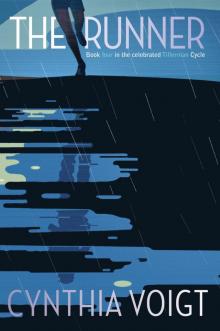 The Runner
The Runner By Any Name
By Any Name Bad Girls, Bad Girls, Whatcha Gonna Do?
Bad Girls, Bad Girls, Whatcha Gonna Do?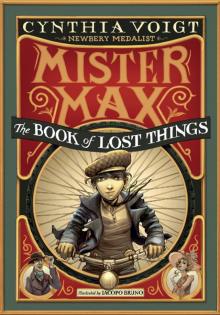 Mister Max: The Book of Lost Things: Mister Max 1
Mister Max: The Book of Lost Things: Mister Max 1 The Wings of a Falcon
The Wings of a Falcon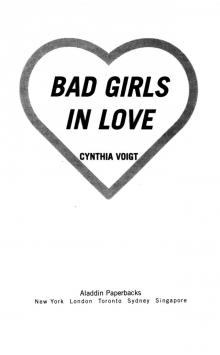 Bad Girls in Love
Bad Girls in Love Toaff's Way
Toaff's Way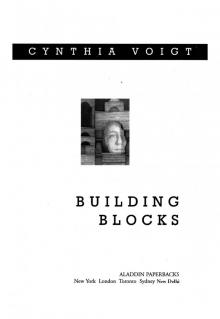 Building Blocks
Building Blocks Orfe
Orfe Tell Me if the Lovers Are Losers
Tell Me if the Lovers Are Losers It's Not Easy Being Bad
It's Not Easy Being Bad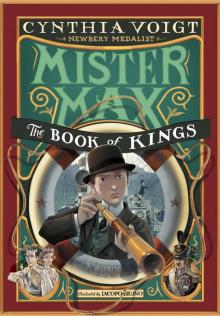 The Book of Kings
The Book of Kings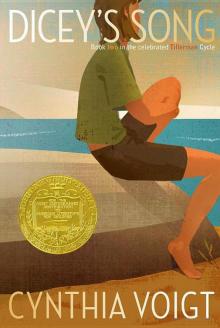 Dicey's Song
Dicey's Song A Solitary Blue
A Solitary Blue Tree by Leaf
Tree by Leaf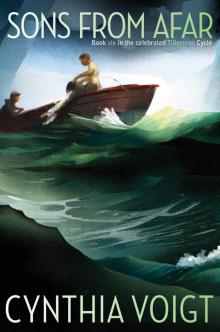 Sons From Afar
Sons From Afar Teddy & Co.
Teddy & Co. Jackaroo
Jackaroo Elske
Elske Izzy, Willy-Nilly
Izzy, Willy-Nilly Come a Stranger
Come a Stranger Mister Max: The Book of Secrets: Mister Max 2
Mister Max: The Book of Secrets: Mister Max 2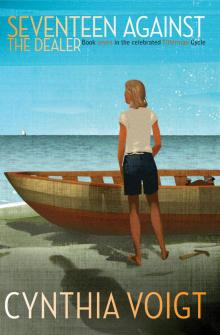 Seventeen Against the Dealer
Seventeen Against the Dealer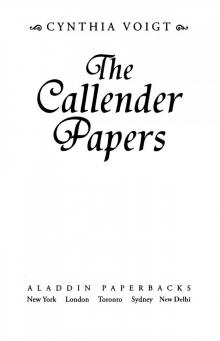 The Callender Papers
The Callender Papers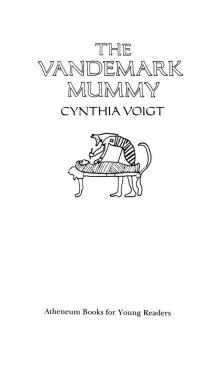 The Vandemark Mummy
The Vandemark Mummy Tale of Birle
Tale of Birle Glass Mountain
Glass Mountain The Tale of Oriel
The Tale of Oriel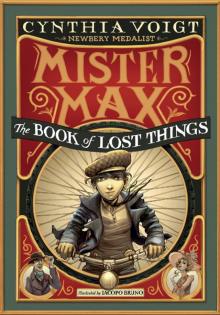 The Book of Lost Things
The Book of Lost Things The Book of Secrets
The Book of Secrets Tale of Gwyn
Tale of Gwyn